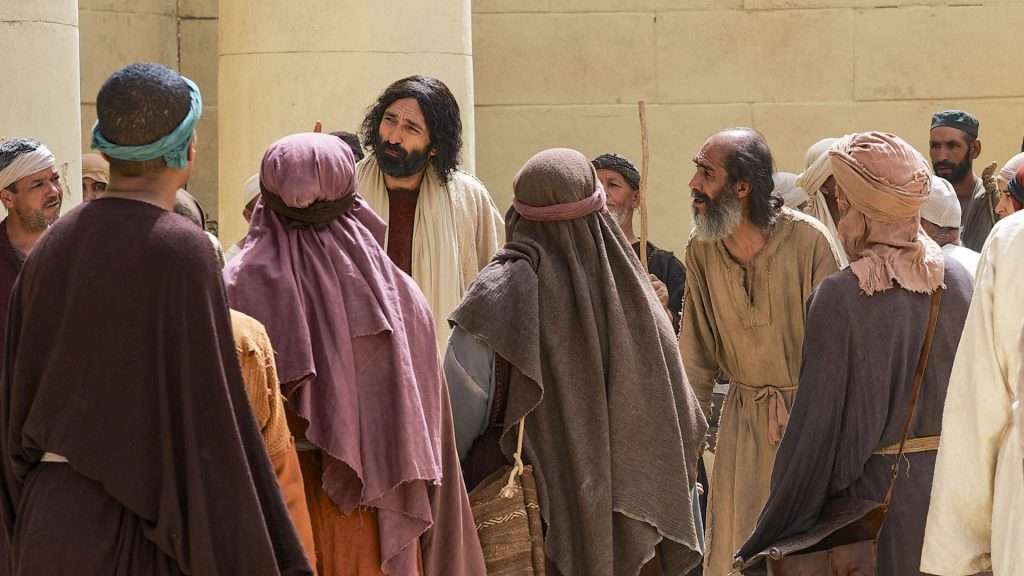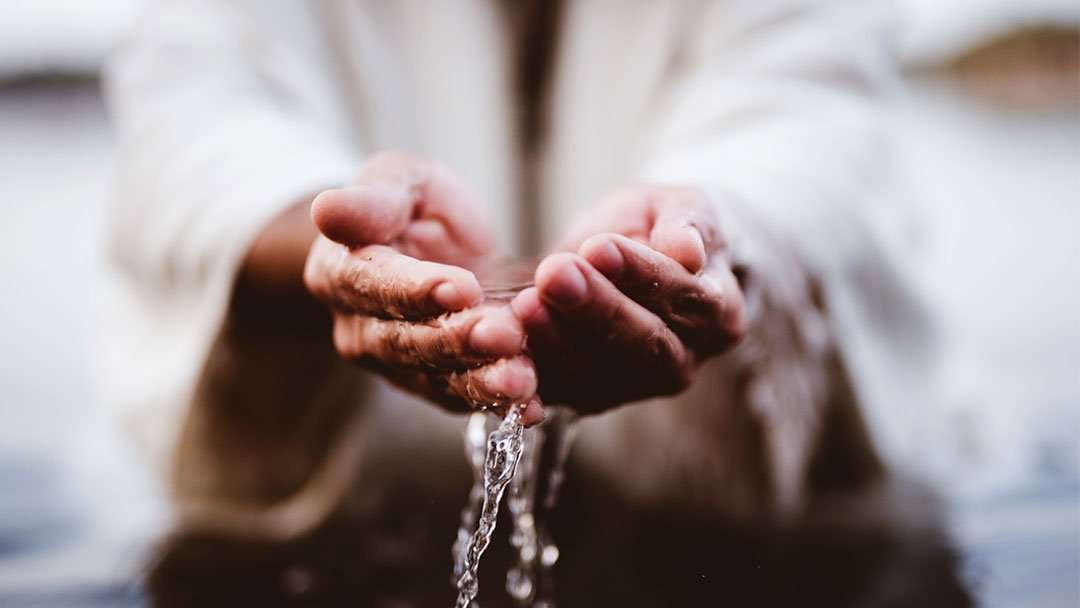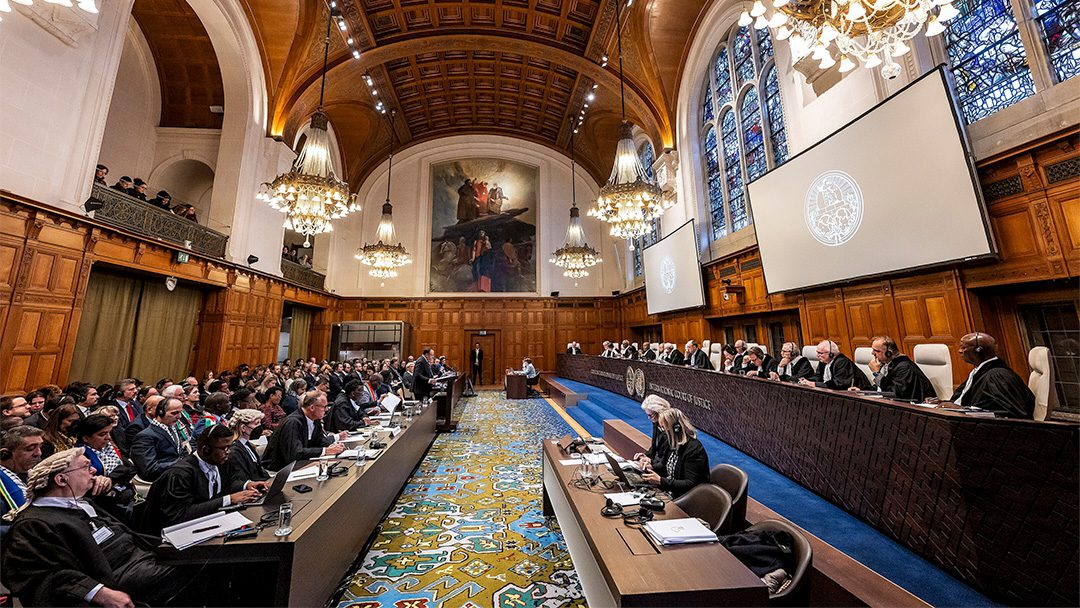As with so much of the Old Testament, it is helpful to see how the Feast of Tabernacles has a prophetic dimension, and we may be encouraged in our Christian journey as we reflect on two particular ceremonies during the feast that we believe point clearly to Jesus, ceremonies relating to water and light.
As we have been seeing, Tabernacles is a feast that is characterised by joy. There is rejoicing in the God who rescues and saves His people and protects and provides for them. For the Jews it was a celebration of God’s dwelling among His people during the long 40 years that the children of Israel were wandering in the desert.
In fact, the Jewish people are specifically commanded to be joyful at this time! “Be joyful at your Feast—you, your sons and daughters, your menservants and maidservants, and the Levites, the aliens, the fatherless and the widows who live in your towns” (Deuteronomy 16:14). By the way, we can learn a lot from the specific inclusion of aliens, fatherless and widows.
Now God has purpose in the times and seasons that He has appointed. There is much to suggest that Jesus—the bringer of great joy to us all!—was born during the Feast of Tabernacles. It is likely that during December (when we celebrate Jesus’ birth), shepherds (to whom came “good news of great joy”) would in fact have their sheep in a protective sheepfold rather than out in the fields in the mid-winter cold.
Also John, in describing the birth of Jesus, used Tabernacle language—“The Word became flesh and made His dwelling [tabernacled] among us” (John 1:14). Jesus, being a Jew, would have faithfully observed the Feast of Tabernacles all His life and used it as an opportunity to teach some things that speak deeply into our hearts.
Let us now turn to John 7:37-39—’On the last and greatest day of the Feast [Tabernacles], Jesus stood and said in a loud voice, “If anyone is thirsty, let him come to Me and drink. Whoever believes in Me, as the Scripture has said, streams of living water will flow from within Him.” By this He meant the Spirit, whom those who believed in Him were later to receive. Up to that time the Spirit had not been given, since Jesus had not yet been glorified.’
Now Scripturally, water has a lot of significance and symbolic meaning, especially at this feast time. Here in Australia we are well aware of the importance of rain—especially those who dwell in the bush. At that time of the year in Israel the long rainless summer months—especially in the arid southern desert region—cause the ground to become parched and much of the wild vegetation to dry up.
we are a people called to take the love of Jesus to a world that is dry and dark, just as Jesus did to the woman caught in adultery.
It can be hard for us to understand all this excitement about water. If we want water, all we usually need to do is turn on a tap and voilà—water! It was very different in Biblical times! Water was often scarce, and the people were very aware of their dependence on God for the rains that were vital for the preservation of life.
Everyone would wait eagerly for the first rains that would bring everything back to life. No rain, no food, no life—it was as simple as that. So it is not hard to understand how “living water”—an ever-flowing source of that which is precious and life-giving—became a major Biblical metaphor for the Holy Spirit.
No wonder that the prophets came to see rain as a symbol of salvation and the work of God’s Holy Spirit, as for example in Ezekiel 36:25-27—“I will sprinkle clean water on you, and you will be clean; I will cleanse you from all your impurities and from all your idols. I will give you a new heart and put a new spirit in you; I will remove from you your heart of stone and give you a heart of flesh. And I will put My Spirit in you and move you to follow My decrees and be careful to keep My laws.”
I was intrigued to discover that before the feast the rabbis taught on every passage in Scripture dealing with water. Then on each of the first seven days of the feast, a priest took a gold vessel and went to the Pool of Siloam to get water. As the Levites led the people in joyful praise and the shofars were blown, the water was poured out at the base of the altar. Said an ancient rabbi: “Anyone who has not seen this water ceremony has never seen rejoicing in his life.”
At one level, this ceremony referred to the rain for the crops. But there was also a prophetic significance to the pouring. It represented the Jews’ Messianic hope because of the outpouring of God’s Spirit upon all Israel expected during the coming reign of the Messiah. So Jesus’ words in John 7 are understood by Christians to be a clear claim to being the Messiah. Some sensed this—others did not—and we read, “the people were divided because of Jesus” (John 8:43). Jesus still has that effect.
We now come to the second Sukkot symbol that Christians believe was used by Jesus to point to Himself as the fulfilment of Scripture—light. At the end of the first day of the feast, the Temple was gloriously lit up by four massive lampstands. Ladders were needed to climb to the top of them in order to ignite the oil in the four golden bowls on each of the lampstands.

Now imagine the scene for a moment! The Temple was on a hill above the rest of the city, so the glow would be visible for miles around. Add to that the vast crowds of Jewish people holding lit torches, and the praise and the music, and you can catch something of the incredible joy and excitement that gripped people’s hearts and stirred their emotions.
The light was to remind the people of how God’s Shekinah glory had once filled His Temple. But in the person of Jesus, the glory of God was once again present in that Temple—unrecognised by the Jews. So once again Jesus used a central ceremony from the Feast of Tabernacles to declare that very fact.
He was teaching in the Temple on the day after the feast. The impact of the Tabernacles celebration and of the light from the huge lampstands would still be fresh in people’s minds. We read first of how Jesus forgave a woman caught in adultery—that spoke pretty clearly about who He was, to those who had ears to hear and a heart to respond!
Then Jesus declared to all who were gathered there: “I am the light of the world. Whoever follows Me will never walk in darkness but will have the light of life” (John 8:12). Many at that time refused to have their own darkness and sin exposed by that light. But there were those who were drawn to that light, drawn by the Holy Spirit. It is no different today.
There is a message here to us all who believe in Jesus as Lord and Messiah. It is a two-fold message of the water and the light of Tabernacles. A message that has very much to do with the fact that we are a people called to take the love of Jesus to a world that is dry and dark, just as Jesus did to the woman caught in adultery. Do you see that?
We are not basically called to live our Christian lives within the four walls of a church building—we are called by the Spirit of God to tell others round about us of the One who is the Living Water of Life, the Living Word. Like Jesus, we are called not to condemn but to forgive. Will you let the Holy Spirit have all of you afresh, every part of your life, so that the pure water of Jesus’ life may flow from you to others?
Physically and spiritually Australia is a dry and thirsty land—the picture I have in my mind is that of a wilderness, of a nation in moral darkness (I hardly need to speak about that). People need so much of the living, refreshing water of the Word of Life, and the joy that comes from following the One who alone is the Light of the world.
And for us that will be a matter of action and deeds as much as of words, as we have seen. That is where the metaphor of light is so relevant. Jesus said in Matthew 5:14-16—“You are the light of the world. A city on a hill cannot be hidden. Neither do people light a lamp and put it under a bowl. Instead they put it on its stand, and it gives light to everyone in the house. In the same way, let your light shine before men, that they may see your good deeds and praise your Father in heaven.”
How much then we need the Holy Spirit in our lives! The booths of Tabernacles, the sukkot, can be put up or taken down in very little time. And they are open to the wind. We too must always be open to the wind of the Spirit, ready to go where God calls us, willing to trade the comforts of this life for the joy of serving our God and loving others into the kingdom. For as Tabernacles reminds us, we are “aliens and strangers in the world”, and “our citizenship is in heaven.”












0 Comments